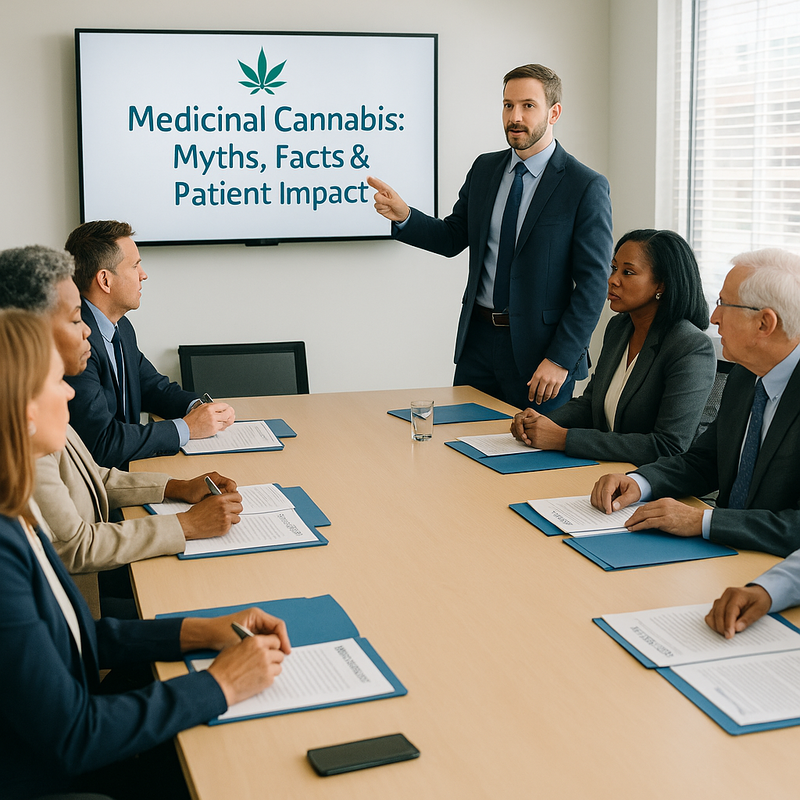
Education about medicinal cannabis is readily available. But information alone isn’t enough. Before real learning can happen, there’s a vital step that often goes unspoken: acceptance.
Specifically, the acceptance that we need to learn - to confront our own assumptions, admit our knowledge gaps, and acknowledge the complexities of a medicine still surrounded by stigma, history, and misinformation.
Information isn’t the same as Understanding
The internet is full of facts and figures about cannabinoids, patient case studies, and emerging clinical trials. Yet, the public conversation remains littered with myths:
“Cannabis is a gateway drug,”
“There’s no evidence it works,”
“It’s just an excuse to get high.”
These aren’t just harmless misconceptions; they directly impact policy, access, and patient care.
This disconnect isn’t because education isn’t available — it’s because people haven’t yet accepted that they might need to be educated in the first place.
Why Acceptance Matters First
Acceptance is the foundation for meaningful learning. Without it, new information is filtered through a wall of bias. People reject what doesn’t fit with what they already believe. In psychology, this is called confirmation bias — and it’s one of the biggest hurdles in cannabis reform.
In practical terms:
- A patient may avoid potentially life-improving treatments because they “don’t believe in cannabis.”
- A policymaker might ignore peer-reviewed evidence because they assume all cannabis users are recreational.
- A doctor might dismiss a patient’s lived experience, choosing outdated medical guidance over curiosity or continuing education.
These aren’t just failures of information. They’re failures of acceptance.
The Role of Shame and Stigma
Many people grew up hearing that cannabis was dangerous, immoral, or illegal. These beliefs become internalised — even for those who now support reform. Accepting the need for education means confronting the shame, discomfort, or fear tied to this subject. It’s emotionally vulnerable work.
This is especially true in professional circles. Admitting “I don’t know enough about cannabis” may feel risky for clinicians, politicians, or regulators - but that humility is what patients, constituents, and the public desperately need to see.
Learning isn’t Weakness - it’s Leadership
We must reframe the act of learning as a sign of integrity, not ignorance. Leaders in public service, health, law enforcement, and education should be encouraged — not criticised — when they say, “I want to understand this better.”
In fact, the most effective cannabis advocates aren’t always the loudest or most radical — they’re often the ones who started out sceptical, but remained open-minded enough to change their view.
Creating Spaces for Accepted Learning
The cannabis sector must do more than share facts. It must create welcoming spaces where people feel safe enough to say:
“I don’t know what this is. But I’m ready to learn.”
This means:
- Offering non-judgmental, evidence-based microlearning (especially for MPs, doctors, and public servants).
- Making space for open questions, even “dumb” ones.
- Acknowledging the emotional barriers people may have about cannabis.
- Encouraging peer-led education, especially from patients.
- Reframing the conversation from “convincing people” to “inviting people.”
In Conclusion
The biggest barrier to medicinal cannabis progress isn’t just lack of data. It’s lack of willingness to admit we don’t know everything yet - and that’s okay.
Educating people about cannabis is important. But helping people accept that they need to be educated? That’s where the real work begins.
The biggest barrier to medicinal cannabis progress isn’t just lack of data. It’s lack of willingness to admit we don’t know everything yet - and that’s okay.
Educating people about cannabis is important. But helping people accept that they need to be educated? That’s where the real work begins.
That’s why the CTA Sector Strategy Committee - Patient Voice is taking the lead in addressing this head-on.
We recognise that lived experience is often more powerful than statistics alone. The Patient Voice committee will be working to create accessible, human-led educational materials and campaigns that help shift attitudes - not just inform minds. By spotlighting real patients, honest conversations, and inclusive learning formats, we aim to support the kind of meaningful education that only becomes possible when people first accept they need it.






